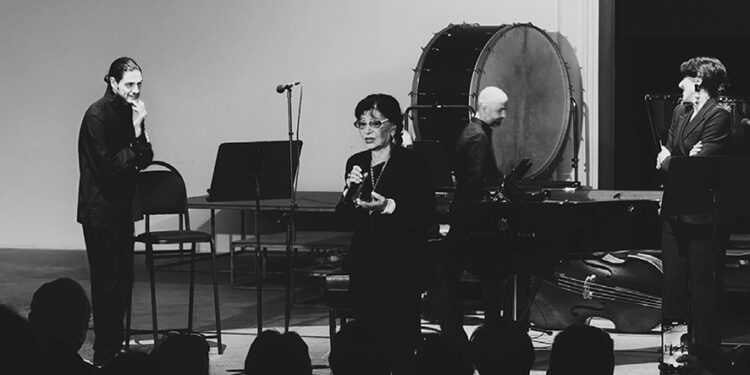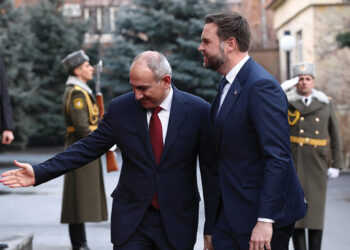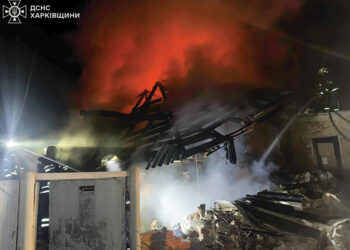On the evening of May 1st, the Georgian Philharmonic Orchestra Auditorium was enveloped in a soundscape at once fragile and searing. Mezzo-soprano Natalia Kutateladze, violist Giorgi Zagareli, and pianist Nikoloz Rachveli did not merely perform works by Giya Kancheli—they communed with the ghosts of a fractured century. The concert, celebrating what would have been the 90th anniversary of Georgia’s most internationally revered composer, became less a musical event than a rite of cultural archeology.
But what exactly are we unearthing when we listen to Kancheli’s chamber music today? How do his muted climaxes and spiritual stillness speak to a current society struggling to narrate its own past? Why does Kancheli, whose music hovers between prayer and protest, still strike a nerve in 2025?

The Quiet Violence of Restraint: Kancheli’s Sound as Political Gesture
In an age of omnipresent noise, Kancheli’s music dares to whisper. His chamber pieces are studies in radical restraint, where long stretches of silence or near-silence rupture suddenly with bursts of melodic anguish. Ethnomusicologist Caroline Bithell, writing on music and trauma, has argued that “silence is not the absence of sound, but the presence of repression and memory.” Kancheli, perhaps more than any other post-Soviet composer, understood this.
Kancheli’s silences are not neutral. They recall the forced quiet of life under Soviet rule. His use of near-static harmonies and slow temporal flow can be read as a refusal of the bombast and teleology associated with Soviet musical ideology. In his music, nothing progresses; everything lingers. As political theorist Michel Foucault might say, Kancheli rewrites the dominant discourse not through contradiction, but through evasion.

Between Monastery and Mourning: Spirituality as Resistance
Kancheli often dismissed interpretations of his work as “religious,” preferring the term “spiritual.” This distinction is key. Where religion can imply institutionalized dogma, spirituality in his music suggests something looser, more personal—a striving for metaphysical clarity in a world mired in historical opacity.
Georgia’s relationship with spirituality is deeply tied to its cultural identity. As a country that converted to Christianity in the 4th century and later resisted both Ottoman and Soviet secularism, the nation has always blurred the lines between music, mysticism, and memory. In this way, Kancheli’s chamber music becomes a form of what anthropologist Victor Turner calls liminality: a threshold state between rupture and reintegration, where new cultural meanings can be formed. He resists narrative closure. His cadences often avoid finality, deferring resolution as if refusing to betray the complexity of history with easy catharsis.
The Chamber as a Chamber: Architecture of Memory
The chamber music form, with its intimacy and spatial closeness, lends itself to the kind of psychic excavation Kancheli performs. One is reminded of Freud’s Wunderblock—his metaphor for memory as a palimpsest where nothing is ever fully erased. Kancheli’s sparse textures and recurring motifs feel precisely like such traces—layered, repressed, but insistently returning.
Philosopher Walter Benjamin once described history as “a constellation of dangers,” suggesting that the past is never safely past. Kancheli’s music embodies this danger. When Rachveli’s piano interrupts a texture of near-stasis with sudden dissonance or irony, it’s not simply a musical event—it’s the eruption of repressed cultural trauma. His performances show how the concert hall can become a courtroom, a chapel, or a crypt.

From the Post-Soviet to the Post-Human
Why does Kancheli still matter in 2025? Because his music offers a rare antidote to both the flattening optimism of late-capitalist aesthetics and the algorithmic predictability of AI-generated compositions. In a world where music increasingly becomes either entertainment or sonic wallpaper, Kancheli’s work insists on slowness, reflection, and emotional ambiguity.
His music is unquantifiable in a data-driven era. It does not yield easily to analysis, playlisting, or virality. This is its power. As theorist Byung-Chul Han notes in The Scent of Time, our age suffers from a “temporal crisis” in which acceleration has replaced depth. Kancheli resists this. His music is time reclaimed, grief examined, memory extended.
The Ensemble Dynamic: A Shared Vulnerability
Mezzo-soprano Natalia Kutateladze did not sing over Kancheli’s textures—she emerged from within them. Her vocal presence was defined less by projection than by absorption: her tone floated, receded, and reappeared like a memory recalled in fragments. In pieces where Kancheli incorporates wordless vocal lines or sparse texts, Kutateladze used the human voice as a fragile medium of vulnerability.
Kutateladze’s nuanced control of breath and silence gave shape to the in-between spaces in Kancheli’s music—the places where meaning evaporates just as it begins to form. At times, she was barely audible, and yet it was in these moments that the emotional weight of the performance was most profound. Her restraint became its own kind of testimony.
Giorgi Zagareli’s performance on viola was the emotional backbone of the evening. The viola, often overlooked in orchestral settings, becomes in Kancheli’s chamber music a voice of understated authority. Its range—earthy, melancholic, and inward—perfectly suits the composer’s introspective aesthetic.
Zagareli played with a tone that was neither romantic nor clinical. Instead, he approached the score as an archaeologist might approach an ancient text—carefully, attentively, always aware of what lies beneath the surface. His handling of Kancheli’s slow arcs and sudden dynamic shifts was exemplary. He did not dramatize or explain the music; he allowed it to speak for itself, and in doing so, rendered it all the more haunting.
Nikoloz Rachveli, both pianist and artistic director of the evening, acted as the concert’s dramaturge—not just in shaping the program, but in embodying the philosophical tension within each piece. Rachveli’s pianism is marked by an unusual clarity of thought. He understands that in Kancheli’s world, the piano is not a vehicle of virtuosic brilliance but a conduit for time itself. His touch was crystalline, controlled, never excessive. In passages where the piano functions as a heartbeat or tolling bell, Rachveli created sonic environments rather than musical arguments. His sense of temporal space—when to let the note linger, when to let it vanish—showed his profound understanding of Kancheli’s vision.
At the very end of the evening, as if to seal the concert with a moment of cultural grace, the audience was gifted a surprise that transcended the program. From the front row, the legendary Nani Bregvadze was invited to the stage. With a quiet, magnetic dignity, she stepped into the light and sang “Ak aris”—a song woven deeply into the collective Georgian memory. Her voice, aged yet unwavering, carried the weight of generations. It was not a performance but a benediction.
The hall rose in a spontaneous standing ovation. This was not simply applause for a beloved artist—it was a gesture of recognition, of shared memory, of gratitude. In that moment, Bregvadze’s voice became a living echo of Kancheli’s own spirit: tender, sorrowful, enduring. The concert closed not with a finale, but with a song that felt like a return—to roots, to silence, to home.
Listening as Ethical Practice
The concert on May 1st was not just a tribute; it was a test. Could we, as listeners, sustain attention through the silences, the subtleties, the slow-burning tensions of Kancheli’s language? Could we accept ambiguity, embrace stillness, and bear witness to a culture’s wounds without demanding resolution?
To listen to Kancheli in 2025 is to practice a kind of ethical listening. It is to affirm that history, pain, and transcendence are not commodities to be consumed, but experiences to be endured and shared. In a cultural moment increasingly dominated by acceleration, distraction, and the flattening of affect, Kancheli’s music stands as a monument of resistance. Not a loud one, but a resonant one—built from whispers, pauses, and the brave refusal to forget.
By Ivan Nechaev














